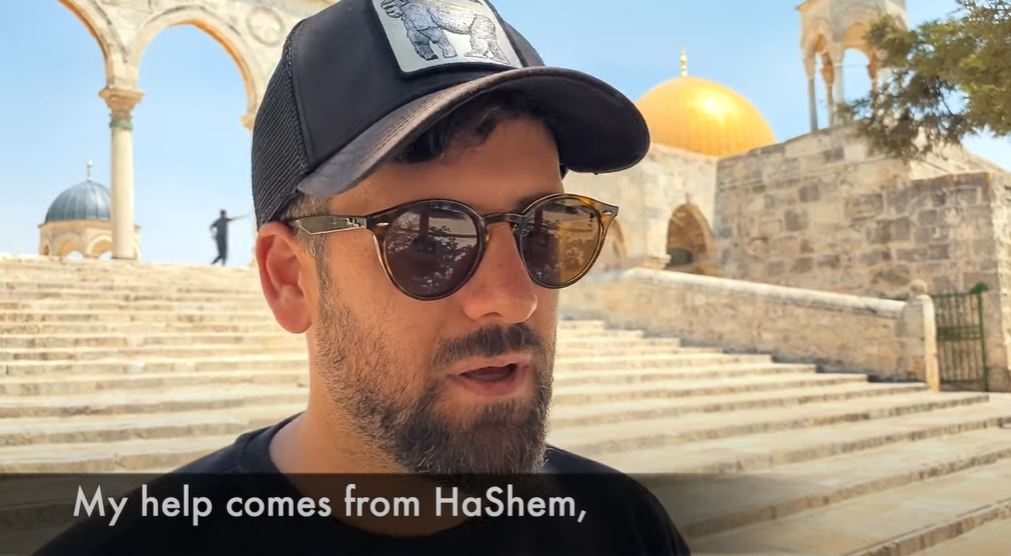Echoing his ancestors from 2,000 years ago, a Levite musician ascended to the Temple Mount and in the face of Muslim opposition, sang the Song of Ascents in the same spot his ancestors sang the same verses in the service of the Temple.
On Saturday night, the month of Elul began. Elul marks a period of austerity and increased devotions focused on repentance in preparation for the Jewish holy days of Rosh Hashanna and Yom Kippur that occur in the beginning of the following month, Tishrei. Yair Levi, a popular Israeli singer, decided to literally take his prayerful music up a level. Levi, as his name implies, is a Levite, a descendant of the tribe of Levi who served in the Temples as musicians. On Sunday morning, Levi ascended to the Temple Mount in order to sing Psalm 121 which is part of the Song of Ascents the Levites used to sing on the steps of the Temple. Levy’s mission was risky as the Waqf prohibits Jews from performing any religious rituals including prayer or the recitation of Psalms on our holiest site. The Israeli police also prevent this in order to prevent a violent Muslim reaction.
The story began in the morning when Doron Keidar and Yair Levi decided to ascend to the Temple Mount. The two are collaborating on several projects together concerning the Temple and thought that a visit to the Temple Mount would be inspiring. For Jews, a vist to the Temple Mount requires preparation by immersing in a ritual bath. After doing so, they decided to take a route past the wall adjacent to the Temple Mount upon which the letters of God’s name are appearing.
“We were sure it was fake news or photoshopped,” Keidar told Israel365 News. “But when we saw the letter so clearly, right in front of our eyes, we were blown away. It is clear that geula (redemption) is happening right now.”
Keidar is intimately familiar with the site and acted as Levi’s guide. When they got to the stairs leading up to the golden Dome of the Rock, Levi spontaneously decided to sing.
“I felt a responsibility to fulfill what my ancestors did for all of Israel,” Levi said. “I am not afraid to say that I am ready to fulfill what Hashem wants from my. I am a Levite and Hashem assigned us the job of bringing music to the Temple. The Temple is like a fruit. Our job is to tend the tree, to do what we can, to bring water, to strengthen the roots and the trunk. And just as the fruit is inevitable, if we do our part, the Temple and the Moshiach will also be inevitable.”
Levi san in a subdued manner but the sight was deeply moving.
“Watching him channel the spirit of his ancestors who served in the Temple by singing that very song in that very spot was inspiring,” Keidar said. “I saw in front of my eyes how deeply connected the Jews are to that very space, something I thought I understood but now I understood in a much more powerful way.”
Before ascending, Keidar and Levy were very clear that his intention was not to incite anger but to create “an act of peace on the Temple Mount.”
“It was not intended as a political statement,” Keidar emphasized. “I think that is why Arabs walked right past us without reacting.”
“I came to express who I was, my connection with Hashem, not to criticize or challenge or argue,” Levi said.
Remarkably, as Levy sang the moving Psalm at the base of the stairs leading up to the Dome of the Rock, the Muslim structure built on top of the Holy of Holies, a Waqf guard can be seen at the top of the stairs, security radio in hand.
“The guard must have been distracted,” Levi said. “Arab women walked by and didn’t notice me singing. I was not singing loudly but that wasn’t the point.”
But just as the Levites were assigned the job of uniting Israel and the world through music, Levi has made this part of his music. Levi ended the song by adding the verse from the Numbers in which Moses cried out to God to heal his sister, Miriam. The verse has special significance for Levi as it inspired him to compose a song from those words. The song became a global sensation and Levi began receiving requests from around the world for prayers of healing. The song was covered in many languages in many countries around the world, including Arabic and even in Lebanon. The special significance for Levi is far more important than a musical hit. The song came to Levi as he was struggling to pray for healing for his grandmother.
“It came up from me in a spontaneous manner. I understood that Moses, who knew the entire Torah, put all of his focus on these few simple words,” Levi said. “The song became immensely popular overnight in a most unusual way. This simple prayer for healing clearly struck a chord with many people around the world in these troubled times.”
“The Temple is all about connecting,” Levi explained. “It connects heaven and earth, the Levites to Israel, the tribes, Israel to the world, and the world to Hashem. Today, it connected me to my ancestors.”
Levi is about to release his next album.




